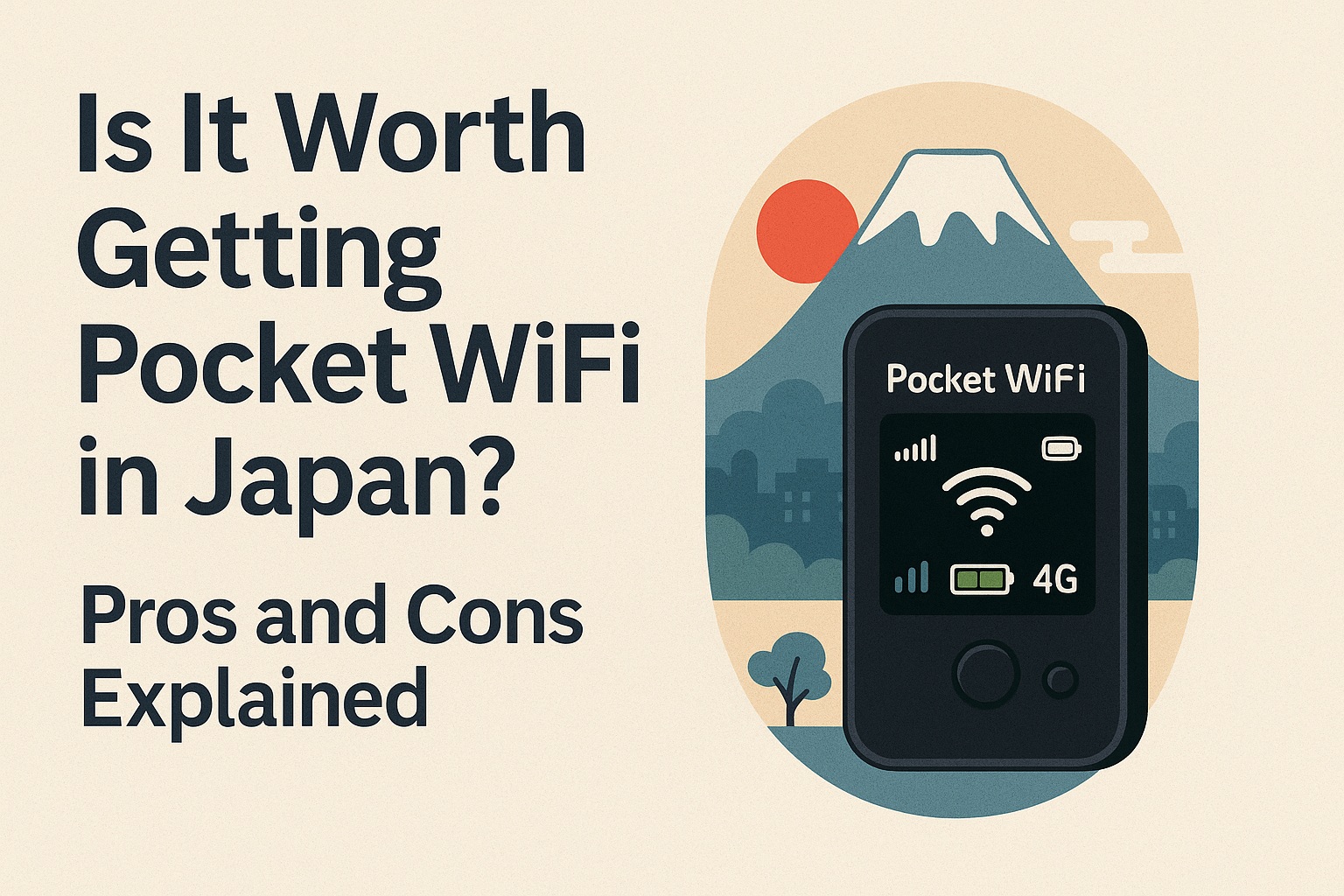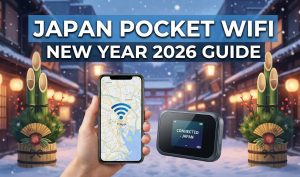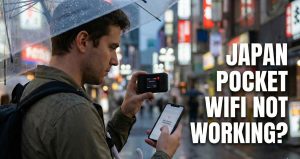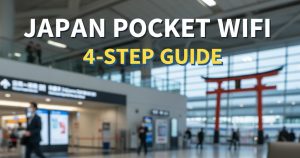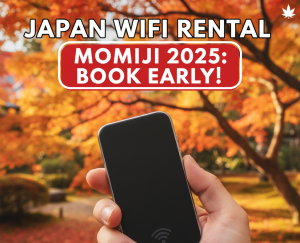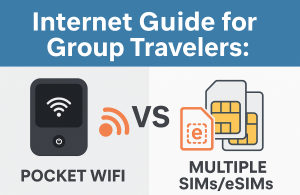Staying connected in Japan is essential for first-time travelers who rely on maps, translation, and messaging. This guide explains the benefits and drawbacks of pocket WiFi, compares it with eSIM and SIM cards, and highlights the unlimited data, easy pickup, and traveler-friendly features of Japan Wireless.
Traveling in Japan is an exciting adventure, full of modern conveniences, breathtaking landscapes, and unique cultural experiences. However, one detail that often surprises visitors is just how important internet access becomes once you arrive. In a country where street signs, menus, and train schedules may be in Japanese only, reliable connectivity can make the difference between a smooth journey and daily frustration. Many first-time visitors quickly realize that depending on free Wi-Fi alone is not practical, and this leads to the big question: is it worth renting a pocket WiFi in Japan?
A pocket WiFi is essentially a portable router that connects to Japan’s high-speed 4G and 5G networks and creates a private Wi-Fi hotspot for your phone, tablet, or laptop. While the idea is simple, the impact on your travel experience can be significant. This article takes an in-depth look at why travelers choose pocket WiFi, how it compares to other options like eSIMs and SIM cards, and what makes Japan Wireless one of the most trusted services in the market.
Why You Need Pocket WiFi in Japan
Despite Japan’s reputation as a highly connected society, free public Wi-Fi remains limited and inconsistent. Airports and some cafés provide it, but connections are often slow, time-limited, or require tedious logins. Many local restaurants and shops do not provide any Wi-Fi at all. This makes it difficult to rely on public hotspots for essential travel tasks such as navigation or communication.
A pocket WiFi solves these problems by giving you a private, high-speed connection wherever you go. Travelers find it invaluable for:
- Navigation: Using Google Maps in train stations or unfamiliar neighborhoods.
- Translation: Instantly translating menus, signs, or conversations.
- Communication: Staying connected on apps like WhatsApp, LINE, or Messenger.
- Entertainment: Streaming music or video on long journeys.
- Group travel: Sharing one device among several people, instead of buying multiple SIMs.
Options for Staying Connected: Pocket WiFi vs. eSIM vs. SIM Card
Before deciding, it’s useful to weigh the main alternatives.
- Pocket WiFi Rental: Offers unlimited data, easy setup, and sharing across multiple devices. Downsides: you must carry and charge an extra gadget, and return it at the end of your trip.
- Roaming with Your Carrier: Simple but often the most expensive, with strict data caps and limits on tethering.
- Local SIM Card: Cheaper for solo travelers with unlocked phones, but usually comes with fixed data packages and works on just one device.
- eSIM: Convenient digital option if your phone supports it. Easy to activate, but most plans have daily data limits and may not allow tethering.
Overall, pocket WiFi is best for groups or heavy users, while SIM or eSIM options may suit solo travelers with lighter needs.
Japan Wireless at a Glance
If you decide to rent a pocket WiFi in Japan, the next question is which provider to choose. One of the most established and trusted names is Japan Wireless, a company that has been serving travelers since 2012. Over the years, more than 800,000 customers have used their services, and the company consistently receives high ratings for reliability, speed, and customer support.
What sets Japan Wireless apart is its promise of truly unlimited data. Many providers advertise “unlimited” plans but impose daily limits, such as throttling speeds after three gigabytes of use. Japan Wireless, on the other hand, offers plans without such restrictions, meaning you can use as much data as you want every day at full speed. For travelers who stream videos, make video calls, or upload large photo files, this makes a huge difference.
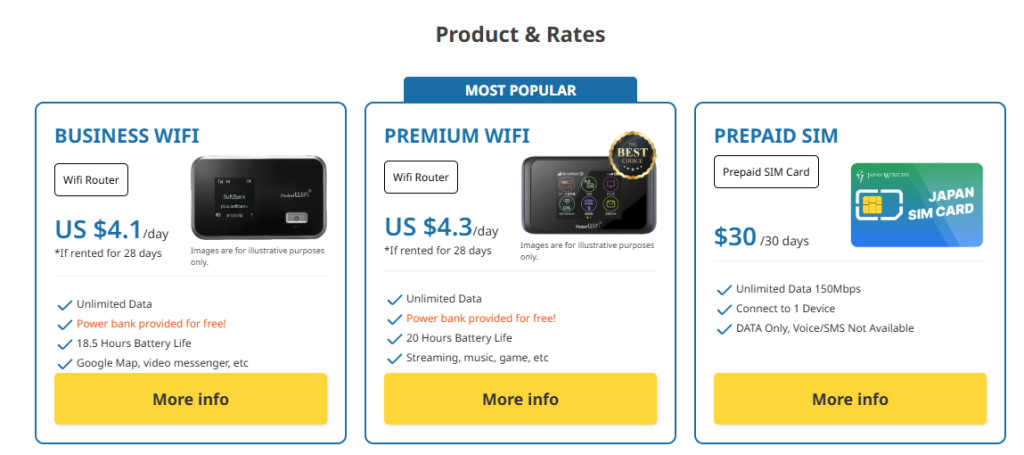
Coverage is another strength. Japan Wireless pocket WiFi devices operate on major carrier networks, ensuring strong signals in cities as well as smaller towns. Even when traveling to rural areas, travelers report reliable connectivity. Speeds can reach up to 187 Mbps on the Premium plan, which is more than enough for streaming high-definition video or even working remotely.
Battery life is often a concern with portable devices, but Japan Wireless addresses this by including a free power bank with every rental. The devices themselves last around 18 to 20 hours on a single charge, and the backup battery ensures you stay connected even on long days of sightseeing.
The rental process is designed with travelers in mind. You can order online in advance and choose to pick up your device at the airport, your hotel, or even a residential address. On departure, returning it is as simple as dropping the prepaid envelope in a mailbox. This flexibility removes the stress of trying to find a rental counter at the last minute.
Customer support is another area where Japan Wireless excels. The company provides English-language assistance, and their staff are known for being responsive and helpful. Should you encounter any issues, a replacement device can be shipped quickly. This focus on service has earned the company a reputation for reliability among international travelers.
Business WiFi vs. Premium WiFi – Which One Is Right for You?
Japan Wireless offers two main pocket WiFi plans: Business WiFi and Premium WiFi. Both include unlimited data, long battery life, and free power banks, but they are tailored to slightly different needs.
The Business WiFi plan provides download speeds of up to 120 Mbps and allows up to five devices to connect simultaneously. It is designed for everyday travel needs such as maps, messaging, social media, and video calls. For solo travelers, couples, or small groups, it is often more than sufficient.
The Premium WiFi plan, on the other hand, offers speeds of up to 187 Mbps and supports up to ten devices. It is ideal for larger groups or those who expect heavy usage, such as streaming high-definition video or working online during the trip. Premium WiFi also provides slightly broader coverage, which can be valuable if you plan to visit rural areas.
Since the price difference between the two plans is small, many travelers choose Premium for peace of mind. However, the Business plan remains a reliable and cost-effective choice for most visitors.
Pros of Choosing Japan Wireless Pocket WiFi
Japan Wireless is one of the most trusted providers, offering unlimited data, reliable coverage, and traveler-friendly service. The main advantages include:
- Truly unlimited data: No daily caps or speed throttling.
- Multi-device sharing: One rental covers phones, tablets, and laptops.
- Easy plug-and-play setup: No SIM swaps or technical steps.
- Reliable speed and coverage: Works across cities and rural areas.
- Battery peace of mind: Long-lasting devices plus free power bank.
- Convenient pickup and return: Available at airports, hotels, and via prepaid mail.
- Traveler support: English-language customer service with fast responses.
- Extra options: Pocket Voice Translator rentals, eSIM add-ons, and insurance.
Cons and Considerations
Pocket WiFi does come with a few trade-offs. Travelers should keep in mind:
- Carrying an extra device: Another gadget to charge and keep track of daily.
- Rental responsibility: Lost or damaged units may incur replacement fees, though insurance reduces the risk.
- Cost for light users: If you rarely use mobile data, SIMs or eSIMs may be cheaper.
- Group dependency: If you split up, only the person with the device stays connected.
- Data only: Pocket WiFi does not provide a local phone number.
- Return process: You must remember to mail the device back before departure.
Summary: Is Pocket WiFi Worth It?
So, is it worth getting a pocket WiFi in Japan? For most travelers, the answer is yes. The convenience of unlimited high-speed data, reliable coverage, and the ability to connect multiple devices outweigh the small inconveniences of carrying and charging an extra gadget. Families, groups, and heavy data users will find pocket WiFi especially valuable, while solo travelers who use less data may consider combining an eSIM with hotel Wi-Fi.
Japan Wireless stands out as a top choice thanks to its truly unlimited data, excellent coverage, traveler-friendly pickup and return system, and commitment to customer support. For just a few dollars a day, it provides peace of mind and ensures you can navigate, communicate, and share your experiences without interruption.
Whether you are visiting Japan for a week of sightseeing, a month of remote work, or a longer stay, pocket WiFi can make your trip smoother and more enjoyable. In a destination where so much relies on real-time information and digital tools, having reliable connectivity is less of a luxury and more of a necessity. With Japan Wireless, that necessity becomes simple, affordable, and worry-free.

